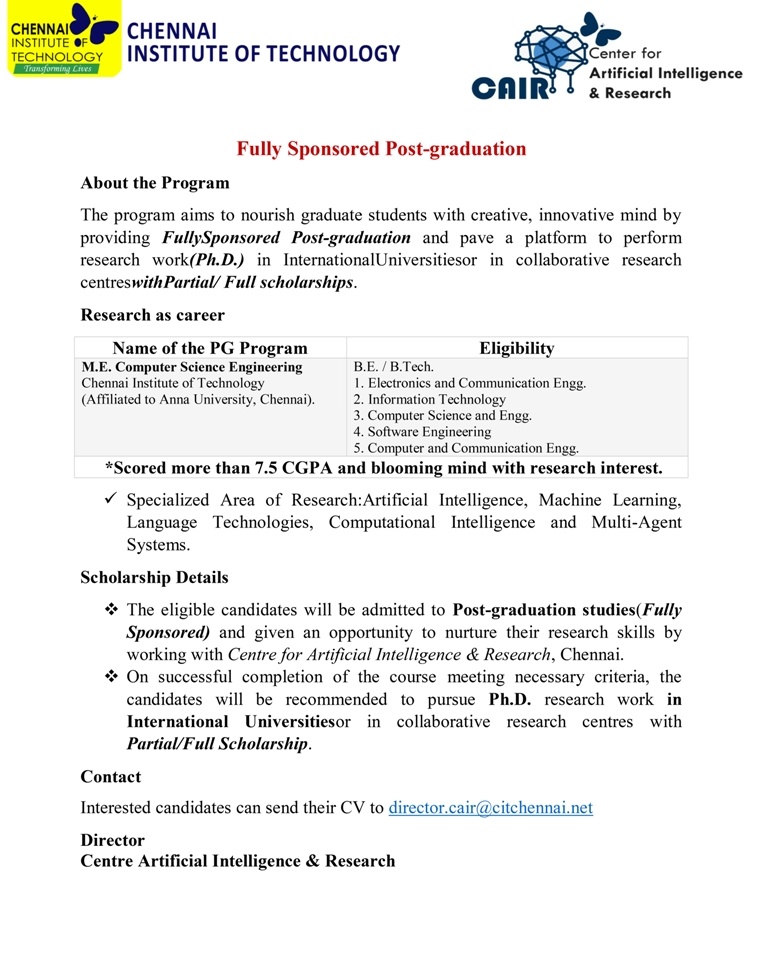CENTER FOR ARTIFICIAL INTELLIGENCE & RESEARCH(CAIR)
About the Centre:
The Center for Artificial Intelligence & Research (CAIR) in Chennai Institute of Technology (CIT) is envisioned to be one of the National Center of Excellence Artificial Intelligence Research and Developments. Over the last few of years, Artificial Intelligence (AI) has changed from a technology with potential to a capability of national importance across the world. While AI has the potential to transform a wide range of sectors, adoption till date has been driven primarily from various sector. The real power of AI, though, lies in its transformative potential to address massive societal challenges and provides a global leadership opportunity for India in creating human-centric, foundational technologies and digital infrastructure that reimagines implementation and delivery in 21st century. CIT-CAIR is giving utmost importance to develop the research facility focused towards various research activities in the areas related to Intelligence Systems Technologies.
CAIR is a core research facility focused towards various research activities in the areas related to Artificial Intelligence, Machine Learning, Language Technologies, Computational Intelligence and Multi-Agent Systems.
Vision:
Create a world class research facility to identify and study Complex Artificial Intelligence Problems, Different Algorithms, Approaches and Methodologies and apply them to investigate Intelligence Systems.
Mission:
-
To generate new knowledge by engaging in cutting-edge research in Artificial Intelligence and Machine Learning and to promote academic growth by offering state-of-the-art programs.
-
To undertake collaborative projects which offer opportunities for long-term interaction with academia and industry.
-
To develop human potential to its fullest extent so that intellectually capable and imaginatively gifted leaders can emerge in a range of professions.
-
To add value to information by delivering dependable information systems to the system services for world, by developing domain & technologies that ensure reliability, security, safety, resiliency, survivability and trustworthiness, enabling the use of these systems in mission critical applications with required guaranties of assured performance.
Specific Objectives:
- Conduct theoretical and applied research in the field of artificial intelligence and advanced Technologies.
- Provide training for upstream and downstream capacity enhancement for artificial intelligence
- Encourage multi-stakeholder participation and decision making in addressing the challenges raised by artificial intelligence.
- Disseminate information and encourage literacy about artificial intelligence.
- Offering Advanced programs for readying the future ready workforce in specific domains.
- Create External Funding and Opportunities.
Research Areas:
- Autonomous Computing
- Health and Medicine
- Intelligent Space Computing
- Legal and Ethics
- Intelligent Smart Cities
- Computational Natural Sciences and Bioinformatics
- Vision and Language
- Geospatial Intelligence
Advisory Board
| Name | Position |
Prof. N. BalakrishnanHonorary Professor |
Chairman |
Prof. Onn ShehoryIntelligent Information Systems |
Member |
Prof. Sankar K. PalNational Science Chair, Govt. of India |
Member |
Prof.Shalabh BhatnagarProfessor |
Member |
Prof CT LinDirector, Computational Intelligence and Brain Computer Interface Centre (CIBCI) |
Member |
Dr. Jey VeerasamyDirector, Center for Computer Science Education & Outreach |
Member |
List of Papers Published
|
[1] R. Janarthanan, PachaivannanPartheeban K Somasundaram, P NavinElamparithi, “A Deep Learning Approach for Prediction of Air Quality Index in a Metropolitan City”, Sustainable Cities and Society, Volume 67, 102720, 2021 https://doi.org/10.1016/j.scs.2021.102720. Impact Factor: 5.268 |
|
[2] R. Janarthanan, D. Srinath, R. Balamurali, “Robotic-Based Nonlinear Device FaultDetection with Sensor Fault and Limited Capacity for Communication”, Journal of Ambient Intelligence and Humanized Computing – Springer, https://doi.org/10.1007/s12652-020-01946-8, 2020. Impact Factor: 3.40 |
|
[3] R. Janarthanan, Doss, S. and S. Baskar. “Optimized unsupervised deep learning assisted reconstructed coder in the on-nodule wearable sensor for human activity recognition”, Measurement -Elsevier (SCI), Vol. 164, https://doi.org/10.1016/j.measurement.2020.108050, 2020. Impact Factor: 3.364 |
|
[4] R. Menaga, R. Janarthanan, K. Deeba, “FPGAImplementation of Low Power and High Speed Image Edge Detection Algorithm,” International Journal of Microprocessors and Microsystems, Vol. 75, https://doi.org/10.1016/j.micpro.2020.103053, 2020. Impact Factor: 1.616. |
|
[5] B.Sakthisaravanan, R.Meenakshi Thank, “A Novel Multilevel Local Region-based Sparse Shape Composition model (NMLR-SSC) with a Novel Features Extraction Method for Liver Cancer Segmentation and Classification”, European Journal of Molecular and Clinical Medicine (EJMCM). (Accepted for Publication). |
|
[6] Sundarambal, B., Subramanian, S., &Muthukumar, B. (2020). A hybrid encoding strategy for classification of medical imaging modalities. Journal of Ambient Intelligence and Humanized Computing. https://doi.org/10.1007/s12652-020-02129-1, Impact Factor: 3.40. |
|
[7] Lakshmi, D., &Ponnusamy, R., Facial emotion recognition using modified HOG and LBP features with deep stacked autoencoders. Microprocessors and Microsystems, 82, 103834. https://doi.org/10.1016/j.micpro.2021.103834.2021,Impact Factor: 1.616. |
|
[8] Vijayaragavan, P., Ponnusamy, R., &Aramudhan, M., An optimal support vector machine based classification model for sentimental analysis of online product reviews. Future Generation Computer Systems, 111, 234-240. https://doi.org/10.1016/j.future.2020.04.046, 2020, Impact Factor: 6.125. |
|
[9] Manikavelan, D., &Ponnusamy, R., Software quality analysis based on cost and error using fuzzy combined COCOMO model. Journal of Ambient Intelligence and Humanized Computing. https://doi.org/10.1007/s12652-020-01783-9, 2020, Impact Factor: 4.594. |
List of Ongoing Projects
| S.No | Title | Details |
| 1. | Secured Mobile App Voting System for Elderly and Non-Participating People | Click here |
| 2. | Design and Development of a System for Searching Drugs in the Pharmacy | Click here |
| 3. | Efficient Flood Forecasting System using Machine Learning for Smart Cities | Click here |
| 4. | Face Mask Wearing Manner Detection | Click here |
Center Members
| Dr. R. Ponnusamy | Director |
| Dr. R. Janarthanan | Research Faculty |
| Dr. B. Sundarambal | Research Faculty |
| Dr. R. Meenakshi | Research Faculty |
| Dr. S.Pavithra | Research Faculty |
| Dr. S.S.Arumugam | Research Faculty |
| Dr.K. Suresh | Research Faculty |
Collaborating Research Institutions



Research
- Area of Research
- Research Supervisors
- Research Supervisors-Mech
- Research Supervisors-BME
- Research Supervisors-Civil
- Research Supervisors-EEE
- Research Supervisors-ECE
- Research Supervisors-CSE
- Research Supervisors-AI & DS
- Research Supervisors-Mechatronics
- Research Supervisors-CSBS
- Research Supervisors-IT
- Research Supervisors-S and H
- Research Supervisors-Cybersecurity
- Research Supervisors-Aritificial Intelligence and Machine Learning
- Patents
- Future Plans
- Research Publications
- New Products / Process Developed
- Centre for Artificial Intelligence& Research(CAIR)
- Centre for System Design (CSD)
- Centre for Non Linear Systems (CNS)
- Centre for Perpetual Mechanics
- Centre for Material Research(CMR)
- Center for Energy (Solar & Wind) & Research
- Centre for Additive Manufacturing
- Center for Defense and Space Research
- Centre for Sustainable Materials and Surface Metamorphosis (CSMSM)







